Johari Window is a useful self development tool that can really help you if you are wondering how to build self awareness. It is the key to being successful in all facets of life – be it personal, professional or social. This technique helps people better understand their relationship with themselves and others.
Human interaction is a complex process. At times what we think about ourselves can be completely different from how others perceive us. At certain other times we are unable to trust a person because we do not know enough about him/her.
Self-awareness thus is vital in enhancing our relationships with better communication skills This in turn makes us more effective and productive.
The Johari Window Model was created in 1955 by Joseph Luften and Harry Ingham. The name is derived from the first names of the creators. This tool is still relevant today, as this can help people to better understand their communication with others.
Understanding the Johari window model will help us develop the metacognitive ability and most importantly give us more clarity around who we are and how we represent ourselves.
The model depicts a window through which communication flows as we give and receive information about ourselves to others. In this model the window represents information, feelings experiences, views attitudes skills intentions motivation and so on.
In the diagram “self “refers to oneself, and “others” refers to all the other people. The 4 perspectives are called regions or quadrants. Each region represents information known or unknown to the individual and information known or unknown to others.
The theory concludes that in order to be self-aware and enhance personal effectiveness and confidence, the individual needs to give and receive feedback of their behavior thereby increasing the size of region 1 and decreasing the region 2 and 3.
Related: 15 Things You Should Stop Doing To Yourself
Johari Window – 4 Quadrants
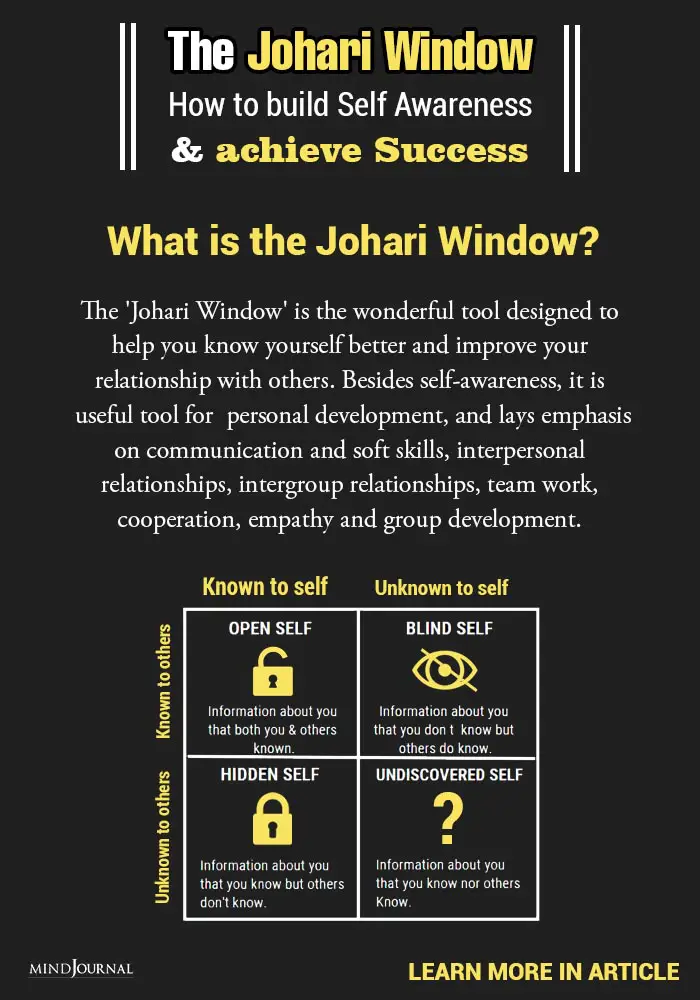
1. What is known by the person about him/herself and is also known by others – open area, open self, free area, free self, or ‘the arena’.
2. What is unknown by the person about him/herself but which others know – blind area, blind self, or ‘blindspot’.
3. What the person knows about him/herself that others do not know – hidden area, hidden self, avoided area, avoided self or ‘facade’.
4. What is unknown by the person about him/herself and is also unknown by others – unknown area or unknown self. A lot in this area is unconscious.
Let’s have a look at the diagram below!
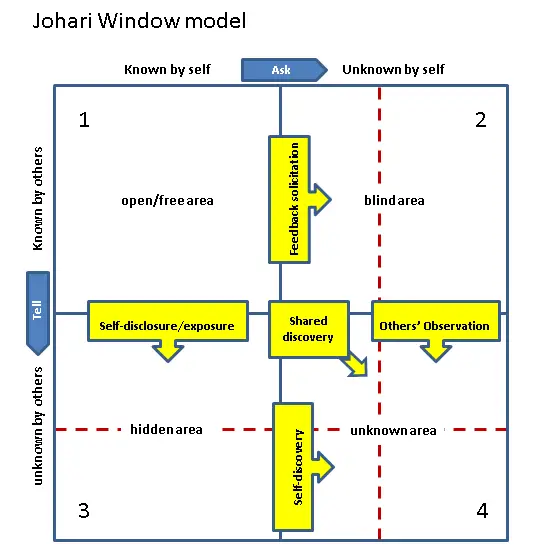
Application Of The Tool
PANE 1– You could list things that are generally known about yourself. This can be simple information, or can involve deep issues (for example, feelings of inadequacy, incompetence, unworthiness, rejection) which are difficult for you to face directly, and yet can be seen by others. This could form the basis for a discussion with a coach or mentor.
PANE 2– You could identify the feedback you would like to receive about your behavior, mannerisms and so on. This could form the basis for small-group sessions, or you can ask for feedbacks from your relationships. It could be used to help with the skill you wish to develop, in the next phase.
PANE 3 – Could include aspects of yourself that you have not told anyone before, but that you might be willing to share during a one-to-one or small-group session, or with your significant others
PANE 4– Could include areas that you would like to explore in a coaching session or with the help of the group / other your significant relationships– your future, how you would react in a particular situation, and so on.
The idea of the process is to enlarge the ‘open quadrant‘ — the larger the open quadrant the more comfortable you will be with yourself, and your relationships, and the more comfortable other people will be with you.
The process of enlarging the open quadrant vertically is called self-disclosure, a give and take process between you and the people you interact with.
As information is shared, the boundary with the hidden quadrant moves downwards. In addition, as other people reciprocate, trust tends to build between them. However, don’t be rash in your self-disclosure.
Disclosing harmless items builds trust. However, disclosing information which could damage people’s respect for you can put you in a position of weakness.
The more you know about yourself and the more other people know about you, the more you can communicate on the same wavelength.
By asking for feedback you can simultaneously reduce your Blind Spot while increasing the amount and quality of information you can share in the Arena or pane 1.
Related: How To Stop Comparing Yourself to Others: 5 Effective Strategies
Johari Window Exercise
This is an example of an exercise you can do with the Johari Window in a group or team or with your significant others.
The purpose is to share more information and reduce blind spots.
The key steps are:
- The subject is given a list of 55 adjectives and you pick 5 or 6 that they think describes their personality.
- Peers are given the same list and they each pick 5 or 6 adjectives they think describe the subject.
- You arrange the adjectives on the Johari Window template based on awareness.
Here’s a summary of how to place the adjectives:
PLANE 1 /Arena – Adjectives selective by the individual and peers or significant others are placed in Arena.
PLANE 2 / Facade – Adjectives selected by the individual only are placed in Facade.
PLANE 3 / Blind Spot – Adjectives selected by peers or significant others only are placed in Blind Spot.
PLANE 4 / Unknown – Adjectives not selected by anybody are placed in unknown.
Adjectives
Here’s a list of the positive adjectives commonly used in the Johari Window exercise (of course there are negative ones as well):
| Able | Independent | Responsive |
| Accepting | Ingenious | Searching |
| Adaptable | Intelligent | Self-assertive |
| Bold | Introverted | Self-Conscious |
| Brave | Kind | Sensible |
| Caring | Knowledgeable | Sentimental |
| Cheerful | Logical | Shy |
| Clever | Loving | Silly |
| Complex | Mature | Spontaneous |
| Confident | Modest | Sympathetic |
| Dependable | Observant | Tense |
| Dignified | Nervous | Trustworthy |
| Energetic | Organized | Warm |
| Extroverted | Patient | Wise |
| Friendly | Powerful | Witty |
| Giving | Proud | |
| Happy | Quiet | |
| Helpful | Reflective | |
| Idealistic | Relaxed | |
| Religious |
Related: 8 Effective Ways You Can Cultivate Positive Thinking
Below is the example of the template which is filled up as a part of the activity:
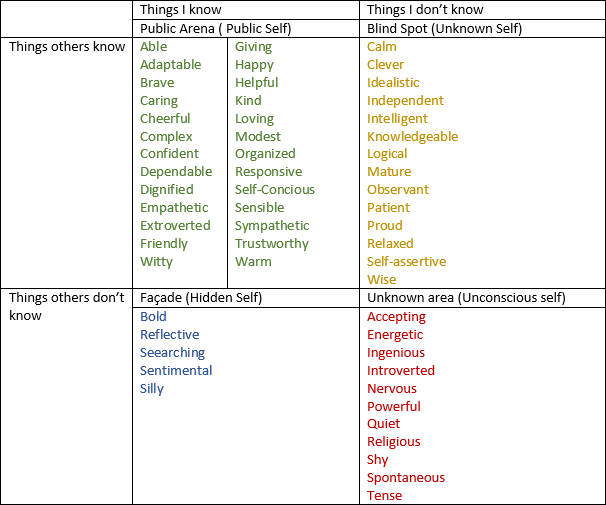
References:
Luft, J., & Ingham, H. (1961). The johari window. Human Relations Training News, 5(1), 6-7. Luft, J., & Ingham, H. (1961). The Johari Window: a graphic model of awareness in interpersonal relations. Human relations training news, 5(9), 6-7. Smith, R. E., Carraher, E., & DeLisle, P. Johari Window Model. Leading Collaborative Architectural Practice, 221-224. Verklan, M. T. (2007). Johari Window: a model for communicating to each other. The Journal of perinatal & neonatal nursing, 21(2), 173-174.
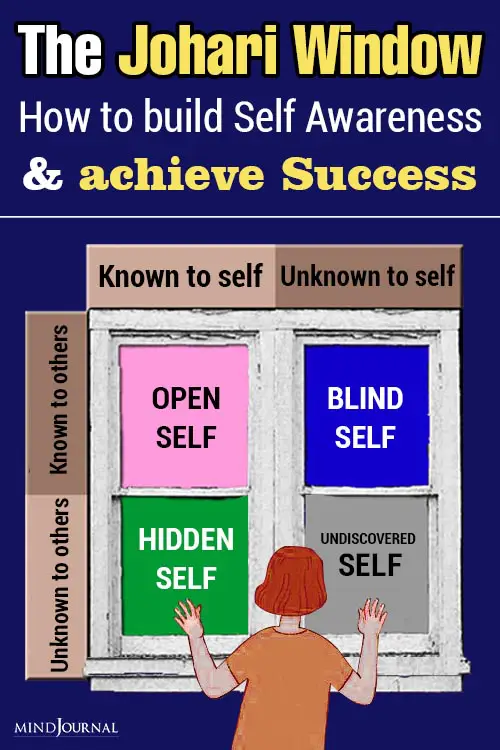
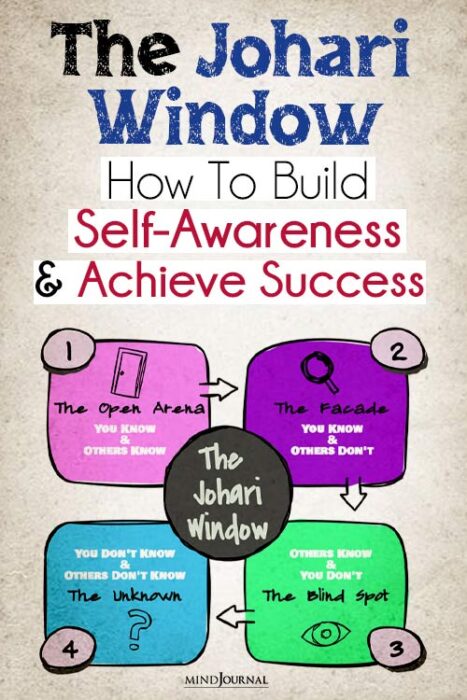
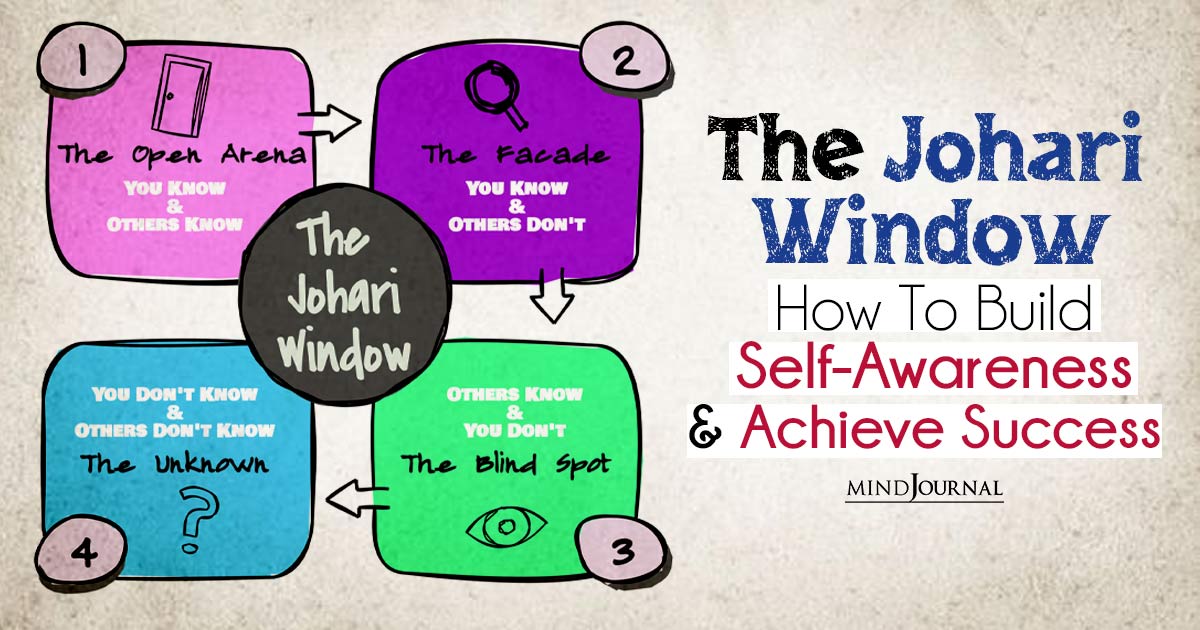







Leave a Reply
You must be logged in to post a comment.